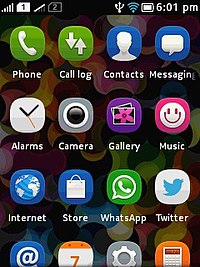Nokia Asha software platform

Main menu interface of the Asha platform
|
|
| Developer | Microsoft Mobile Oy (originally Nokia) |
|---|---|
| OS family | Mobile operating system |
| Working state | Discontinued |
| Source model | Closed source |
| Initial release | May 9, 2013 |
| Latest release | Asha Platform 1.4.0.6 |
| Marketing target | Entry-level smartphones |
| Available in | Multi-lingual |
| Package manager | Nokia store |
| Platforms | ARM |
| Kernel type | unknown, descendant of Series 40 |
| Default user interface | Nokia Fastlane, Swipe |
| Official website | Nokia Asha — Platform overview |
The Nokia Asha platform is a mobile operating system (OS) and computing platform designed for low-end borderline smartphones, based on software from Smarterphone which was acquired by Nokia. The platform inherits UI similarities from Symbian, Maemo and MeeGo, and replaces Series 40 on Nokia's low-end devices. The user interface design team was headed by Peter Skillman, who had worked previously on webOS and the design of MeeGo for the Nokia N9.
It is the successor to the Meltemi project which Nokia was developing as a Linux platform to replace Series 40, but was cancelled in July 2012.
The first phone based on the platform is the Nokia Asha 501, and were followed by the Asha 500, Asha 502 Dual SIM, and Asha 503, all announced at Nokia World in October 2013. Another phone, the Nokia Asha 230 was announced on February 24, 2014, comes pre-installed with Asha platform 1.4.
Apps for the platform are either made using Java ME, or as web apps, which are rendered by the Nokia Xpress browser which uses the Gecko rendering engine. The mobile operating system lacks true multitasking but the radio and music app can run in background mode (which is advertised as multitasking), while swiping to fastlane apps will actually close down previously opened applications instead of minimizing them.
It features a notification centre, named Fastlane, which is accessible by swiping to the left of the home screen.
...
Wikipedia
